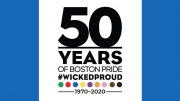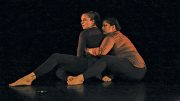The actress talks why this role made her feel less ‘rosy’ about gay rights
By: Chris Azzopardi*/Special to TRT—
When Olympia Dukakis tells you about the time she cussed out a threatening cab caller, you know she was born to play Stella, a ballsy lesbian who takes her blind wife-to-be (played by Brenda Fricker) on a road trip in Cloudburst.
This, of course, isn’t Dukakis’ first time taking on a tough female. With unforgettable roles in Steel Magnolias and Moonstruck, she’s been cutting through the bull for the bulk of her career.
Dukakis did exactly that in our interview, too, when she derailed into a passionately heated rant on her frustration regarding the lack of distribution for the heartfelt dramedy Cloudburst, suggesting that maybe, when it comes to gay liberation, we still have a long way to go.
Chris Azzopardi: You’re a hoot in Cloudburst, Olympia.
Olympia Dukakis: Thank you. A “hoot” is good. My mother used to say that people were a hoot. It’s wonderful. I love it. Hoot!
Q. Do you know any lesbians like Stella?
A. Like Stella? No, not quite that … out there. Not that much, no. She’s feisty. She doesn’t let people walk all over her. She’s blunt that way. Life has taught her that lesson.
Q. Marriage is obviously at the core of the film, because these are two women going on a road trip together to get married.
A. Who never expected to get married! It never even occurred to them. It wasn’t something on their radar.
Q. Because most lesbians of that generation didn’t anticipate ever being able to legally marry in their lifetime.
A. That’s the point! That’s the point about how it’s changing. That’s the point of what it was and what it’s moving toward now.
Q. How are you feeling about the progress we’ve made to recognize gay marriage legally?
A. That I feel good about. I can see it changing. But I’ll tell you what I don’t feel good about: This film cannot get distribution in this country. Yeah, sit with that for a little bit. Sit with that! Don’t get too rosy in your view of things. You can’t get this distributed in this country.
Q. What is the deal with that?
A. Yeah, what is the deal with that? It played 10 weeks in Toronto. It’s going to be playing all over the world. Why can’t it get distributed? The DVD’s coming out and that’s why we’re doing all these interviews and everything, to let people know that it’s out there, especially the gay and lesbian world.
Q. I spoke with director Steven Soderbergh about this when his Liberace movie, Behind the Candelabra, premiered on HBO recently. He said Hollywood wouldn’t market his movie because they knew they were going to lose on investment. The only audience for it, they told him, was a gay audience; it wasn’t mainstream enough.
A. Well, that’s what they say, but it’s not playing 10 weeks in Toronto because it’s only playing to a gay audience. I don’t know about Liberace, but that’s not true about Cloudburst. It’s playing 10 weeks in Toronto! There are other countries it’s playing in; it’s not just the gay and lesbian community (wanting to see it).
Q. What are your feelings on the lack of distribution of the film, then?
A. I wish I did understand. Sidney Kimmel Entertainment has the distribution rights. They sold it to Lifetime, and of course you know what Lifetime did with it. They played it initially at 11 at night and at 3 in the morning, and they bleeped everything.
Q. Did the marriage of two gay people as a political statement play into your desire to take this role at all?
A. It did, mostly because I have some gay friends. I sent (the script) to lesbians and they were very moved by it. I wanted to make sure that there was nothing that they found offensive. I didn’t, but I wanted to make sure that they didn’t. They were very moved by it and so eager for me to do it. And they were so happy that it was being done, because these two women are in their 70s, and of course their lives as two lesbians is very different from the lives of two lesbian partners who are 20 and 30 today. Their families rejected them, they had to hide, they had to pretend, and they had to do a lot of different things.
Q. Were there specific scenes you thought might be offensive to the lesbian community?
A. No, I just wanted to make sure that they felt that the characters were delineated honestly. There wasn’t any particular scene. For example, I know everything about being Greek-American, and so I know when something doesn’t ring true, you know? And I wanted to know if things rang true for them, and they did, so I felt really supported by that. I thought, “What’s the point in doing this film if it’s not going to mean something to the people whose lives are being somewhat represented in it?”
I have felt, myself, an outsider from the time I was young because of being first-generation Greek in neighborhoods that were dominated by Irish and German in Massachusetts. I know what that is. And the truth of the matter is, you end up having problems with being a Greek and problems with being an American. You kind of straddle that hyphen in the middle. So feeling like an outsider, I had my own version of that.
Q. Does that come into play at all when you’re playing a role like Stella?
A. Yeah, it does. You know what it is, not to feel valued and to be rejected … and not for who you are or what you’ve done, but just because you happen to have a stamp on you that says Greek-American, or gay or lesbian or black or Latino or Asian and on and on and on. We human beings do such a job on each other.
Q. You’ve worked with director Thom Fitzgerald on The Event, 3 Needles and now this film. What is it about Thom and his directing style that keeps you coming back?
A. He can be trusted. When he tells me something, I don’t even ask anymore. If he says it, I do it. Yeah, he’s pretty damn good. Plus, he’s a terrific writer and he shoots a terrific film. All the locations were wonderful. We shot up in Halifax, Nova Scotia. An incredible place. I couldn’t get over it. I would just stare at those rock formations in the harbor and at the mountains. I would just sit there and stare at them and somebody said, “Well, we didn’t wanna disturb you; we knew you were thinking about the part.” I wasn’t thinking about the part. I was thinking about how these two rocks in the middle of the harbor looked like a mother seal and a baby seal! (Laughs)
Q. Here they thought you were deep in thought about your next take.
A. I know. They thought I was being an artist. I was just being a tourist.
Q. The gay community has always been drawn to the strong female characters you’ve played. When did you first realize you had a gay following?
A. I think it was with Tales of the City, wasn’t it? That’s when it happened. I started to get letters thanking me and people coming up to me on the street crying and wanting to tell me how much it meant to them. And I still get that, actually.
Q. What does it feel like receiving all that acknowledgement for that role?
A. Of course at first I was very surprised, because it hadn’t occurred to me. I was just doing the best job I could. I wasn’t thinking about how I was representing any particular group, which was not true with Cloudburst.
Q. For Tales of the City, what was it like playing trans during that time, in the early ’90s?
A. See, for me it was just a human being who had something in them that they had kept secret and silent and protected and who was now coming forward. I understand that. I had that.
Q. How do you reflect on working with Cher for Moonstruck?
A. We were very sympathetic with each other. “Simpatico,” I think is the way she puts it. It was never a problem, never anything. It was easy. It was like we knew each other and we trusted each other without even thinking about it.
Q. Are you close with any of the gals from Steel Magnolias?
A. Oh, not really. For a while Shirley (MacLaine) and I went back and forth. We’d see each other now and then. I’ve gone to see her show; she came to see me in something. But that’s about it.
Q. How was the role in Cloudburst a new challenge for you?
A. Well, the challenge was physical for me. To restrain my movements, to shape my gestures, the way I physically behaved – Thom was very insightful about that and very watchful. And he was very particular about how he wanted my hair. I looked at myself a couple of times and I thought, “My god, that’s a man. I look scary. That is a man up there.”
Q. How did you get in touch with Stella’s butch toughness?
A. Thom was the one who really pushed me in that direction. I happen to be kind of rebellious myself, to be honest with you. I don’t have trouble being confrontational. I grew up in Lowell, Mass. and by the time I was 12 I had my own knife, so I was used to drawing lines and making sure nobody stepped over them – metaphorically, I’m talking.
This is so hysterical. Yesterday a friend and I were trying to get a cab. So we go to this one cab and this guy and this woman were there before, so we turn around and we go look for another cab to come down the street. They were at the corner and we had moved into the middle of the block. All of a sudden I hear a voice saying, “There’s a line here! There’s a line here!” and I look over and they’re still not in the cab and he’s yelling about a line. I said, “Line? What line? I don’t see a line.” He just wanted me to go to the corner and wait behind him while he got the cab coming down the street. He starts coming toward me, threateningly, and I said to him, “What are you, gonna hit me, motherf#$@er? You wanna hit me? Is that what you wanna do?” He stopped, dead in his tracks. And this woman said to him, “That’s Olympia Dukakis!” And he backed off. He didn’t wanna get in trouble with an aging 82-year-old celebrity who’s screaming at him in the street.
Q. Well, you certainly have the willpower of Stella.
A. And he knew that. Thom knows that about me. I mean, I’m very judicious about it. (Laughs)
Q. Did you learn any new vulgarities after doing this film?
A. No, no, no, no.
Q. Well, you’re very fond of the “c” word in it.
A. That I can’t take credit for. Thom wrote the script! (Laughs) But the finger gestures, I have to take responsibility for most of those.
*Chris Azzopardi is the editor of Q Syndicate, the international LGBT wire service. Reach him via his website at www.chris-azzopardi.com.








